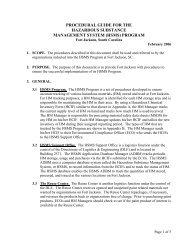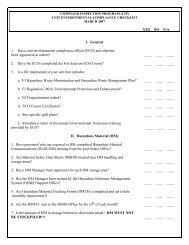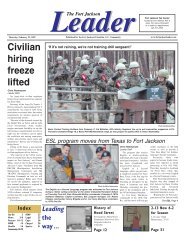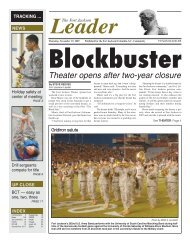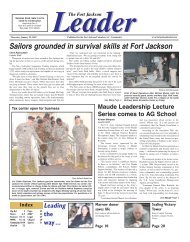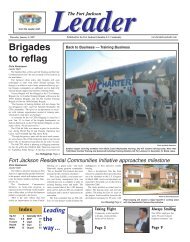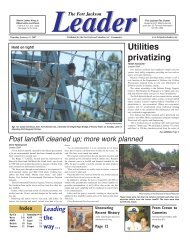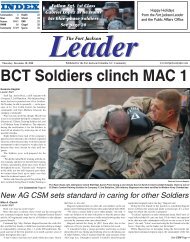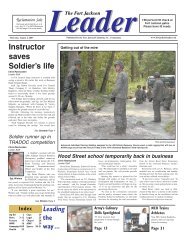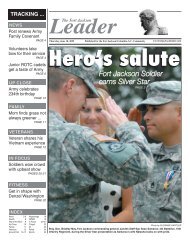Apr 3 - Fort Jackson - U.S. Army
Apr 3 - Fort Jackson - U.S. Army
Apr 3 - Fort Jackson - U.S. Army
Create successful ePaper yourself
Turn your PDF publications into a flip-book with our unique Google optimized e-Paper software.
Health<br />
TRICARE offers resources to help<br />
beneficiaries get health care info<br />
Patricia Opong-Brown<br />
TRICARE Management Activity<br />
FALLS CHURCH, Va. –– How do<br />
TRICARE beneficiaries access information<br />
about their benefits? TRICARE<br />
Management Activity officials want to<br />
remind beneficiaries there are many<br />
available resources.<br />
“It is a high priority for us to make<br />
sure beneficiaries know they have several<br />
ways to get information on their TRI-<br />
CARE benefit as well as assistance,” said<br />
<strong>Army</strong> Maj. Gen. Elder Granger, deputy<br />
director, TMA.<br />
The “first line of defense” for benefit<br />
information should always be the regional<br />
Managed Care Support Contractor<br />
toll-free numbers, but TRICARE Service<br />
Centers are a great option for beneficiaries<br />
who want up-close-and-personal<br />
service.<br />
TSC representatives are available to<br />
assist beneficiaries with enrollments,<br />
finding TRICARE network providers, referrals<br />
and authorizations, claims and<br />
much more on a walk-in basis. Most<br />
TSCs are located inside, or in close proximity<br />
to, military treatment facilities and<br />
are managed in the United States by the<br />
MCSCs.<br />
TSCs are also located throughout the<br />
world. In Europe, the Pacific, Latin<br />
America and Canada, TSCs are contracted<br />
by the TRICARE Area Offices ––<br />
which are additional resources for beneficiary<br />
assistance overseas.<br />
After beneficiaries have already<br />
sought assistance from the regional tollfree<br />
lines or at a TSC, they can contact a<br />
Beneficiary Counseling and Assistance<br />
Coordinator.<br />
There are nearly 900 BCACs around<br />
Pharmacies open on Saturday<br />
On-post pharmacies are open Saturdays<br />
for customer convenience.<br />
The main hospital pharmacy is open<br />
from 7:30 a.m. to noon and the refill<br />
pharmacy is open from 9 a.m. to<br />
noon. To refill a prescription: call<br />
toll-free (866) 489-0950; call 751-<br />
2250; or visit online at<br />
http://www.moncrief.amedd.army.mil.<br />
Health Talks<br />
To have a professional staff member<br />
from MEDDAC address a group<br />
on health care subjects or preventive<br />
medicine , call the health promotion<br />
coordinator at 751-5035 or the Department<br />
of Quality Management at<br />
751-2501.<br />
the world, and they wear many hats.<br />
Serving at each TRICARE Regional<br />
Office and most military treatment facilities,<br />
BCACs can help beneficiaries with<br />
a range of needs, including answering<br />
questions about medical coverage and<br />
benefits, coordinating with regional contractors<br />
on health care-related issues and<br />
much more.<br />
To get help with TRICARE questions,<br />
beneficiaries should first call their region<br />
or area offices toll-free at: Humana Military<br />
Healthcare Services, Inc. South Region,<br />
(800) 444-5445, (888) 777-8343<br />
(toll-free from the United States and its<br />
territories)<br />
Beneficiaries can find their nearest<br />
TSC by logging onto<br />
www.tricare.mil/contactus/. To find a<br />
nearby BCAC, log on to<br />
www.tricare.mil/bcacdcao/.<br />
MEDDAC Soldier<br />
of the Month<br />
Photo by Nichole Riley<br />
Spc. Sarah Connell was named the<br />
Medical Command’s Soldier of the<br />
Month for March.<br />
Registrars play significant role in battle against cancer<br />
National Cancer Registrars Association<br />
Cancer registrars around the world will join their colleagues<br />
and local community leaders to commemorate<br />
the annual National Cancer Registrars Week, which begins<br />
Monday.<br />
This year’s theme, “Cancer Registrars: More than Just<br />
Statistics,” reflects the expansive role of cancer registrars<br />
and cancer registry data across the spectrum of cancerrelated<br />
initiatives.<br />
As the Trust for America’s Health reported in its<br />
analysis of state cancer registries, “Information is the<br />
most vital tool for finding ways to more effectively treat<br />
and prevent the disease.”<br />
“Cancer registrars are at the core of the nation’s anticancer<br />
efforts, so it is imperative that the information we<br />
provide is of the highest standard,” said Sally Kruse,<br />
NCRA president. “We are data collection and manage-<br />
Did you<br />
know?<br />
–– The tooth is the<br />
only part of the<br />
human body that cannot<br />
heal and repair on<br />
its own.<br />
–– A square inch<br />
of skin has 100 sweat<br />
glands.<br />
–– The human<br />
scalp has an average<br />
of about 100,000<br />
hairs.<br />
–– Fingernails and<br />
toenails take about<br />
six months to grow<br />
from base to tip.<br />
ment experts with the training, specialized skills and eye<br />
for detail to provide the high-quality data required in all<br />
avenues of cancer statistics and research.”<br />
Cancer registrars work in the complete range of cancer<br />
treatment and research settings managing a wide<br />
range of demographic and medical data on people with<br />
cancer.<br />
The information is submitted to state and national<br />
cancer registries for use in research, treatment and prevention<br />
initiatives, enabling cancer programs to accurately<br />
determine cancer patient populations, measure<br />
outcomes of treatment and survival and formulate plans<br />
for quality improvement.<br />
“As we focus on the contributions of cancer registrars,<br />
it is especially important that we also highlight the growing<br />
demand for trained and qualified cancer registrars as<br />
key components of all cancer control initiatives,” Kruse<br />
said. “We must work together with our allies in the<br />
health community to ensure that we continue to recruit<br />
and train qualified candidates to enter into the cancer<br />
registry field.”<br />
Quality cancer data is central to the nation’s cancer<br />
fighting efforts and cancer registrars are the first link in<br />
capturing data on patients diagnosed with cancer. This<br />
data often results in the publication of groundbreaking<br />
research, such as the American Cancer Society’s annual<br />
cancer statistics.<br />
Key results in the study are based on data from two<br />
national registries—the Surveillance, Epidemiology and<br />
End Results (SEER) program of the National Cancer Institute<br />
and the Centers for Disease Control and Prevention’s<br />
National Program of Cancer Registries. For more<br />
information on cancer registrars e-mail info@ncrausa.org.<br />
Adult Preventive Health Services<br />
Recommended tests for adults<br />
Test Age Frequency<br />
Blood Pressure 18 and older Every office visit or yearly<br />
(Hypertension)<br />
Cholesterol 35 and older Every five years if levels are normal<br />
(Hyperlipidemia)<br />
Mammogram 40 and older Every year<br />
(Breast cancer) (women)<br />
Pap Smear 21 and older Every one to three years<br />
(Cervical cancer) earlier if sexually active<br />
Chlamydia 25 or younger Yearly until age 26<br />
(Chllamydial infection) (women, if sexually active)<br />
Colonoscopy 50 and older Every five to 10 years if normal<br />
(Colon cancer)<br />
Stool Occult Blood 50 and older Every year<br />
(Colon cancer)<br />
Bone Mineral Density 65 and older Periodically<br />
(Osteoporosis) (women)




